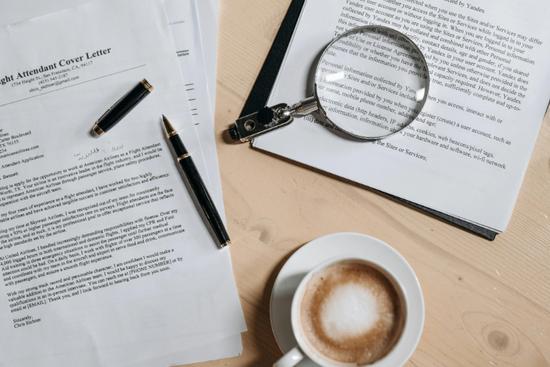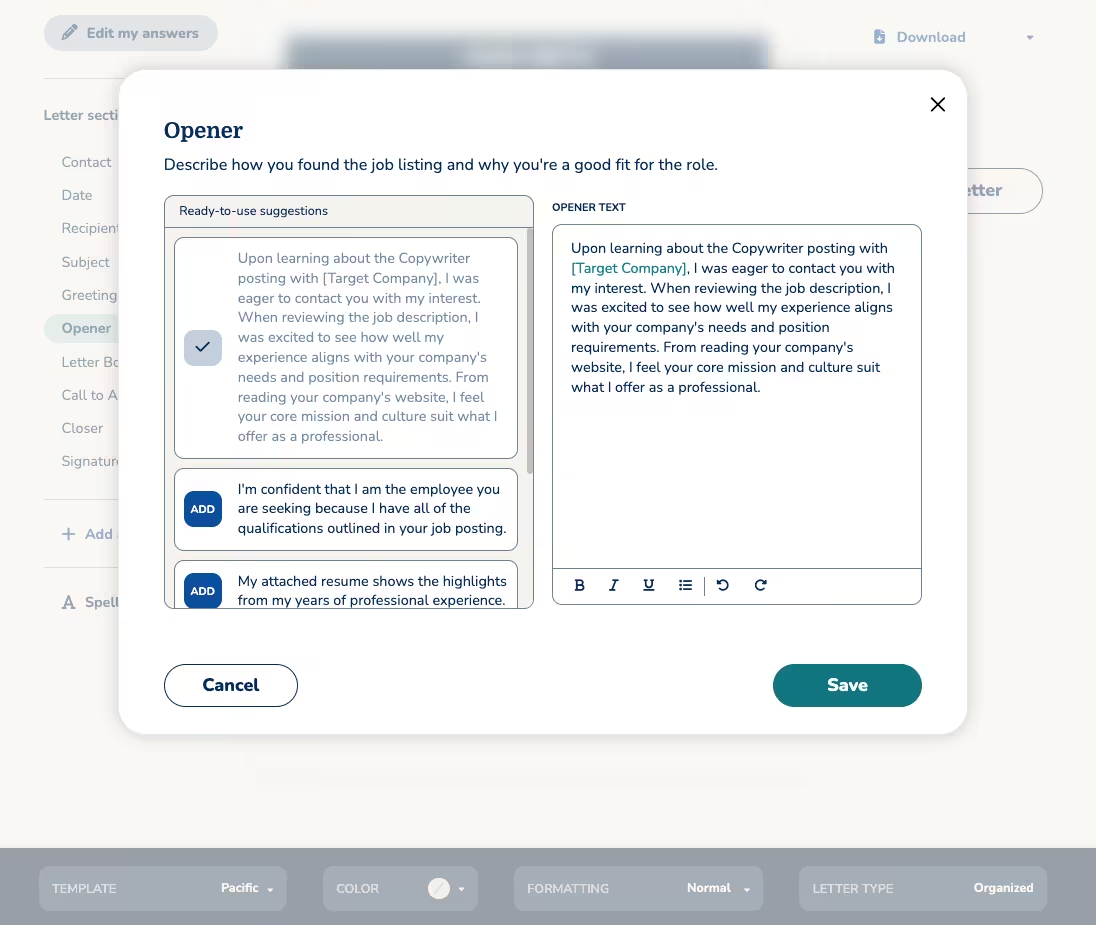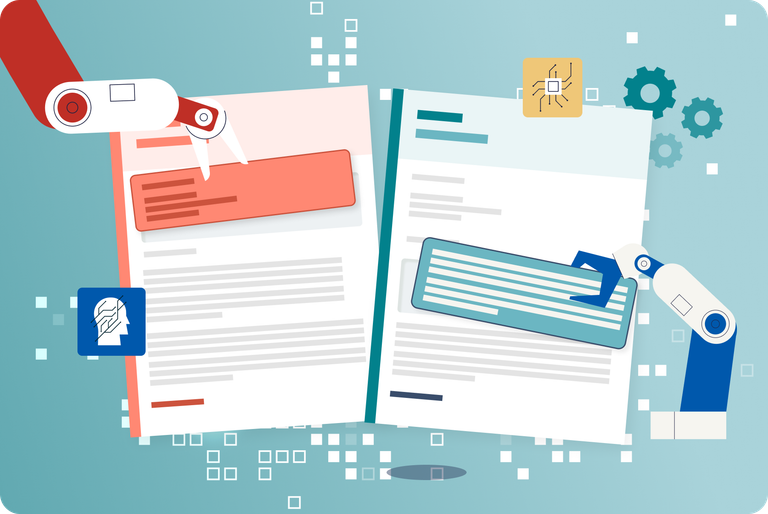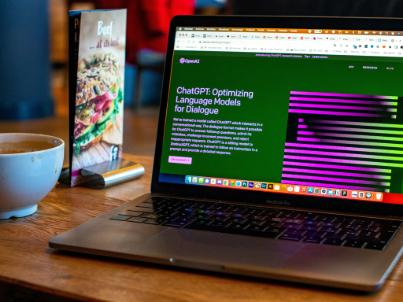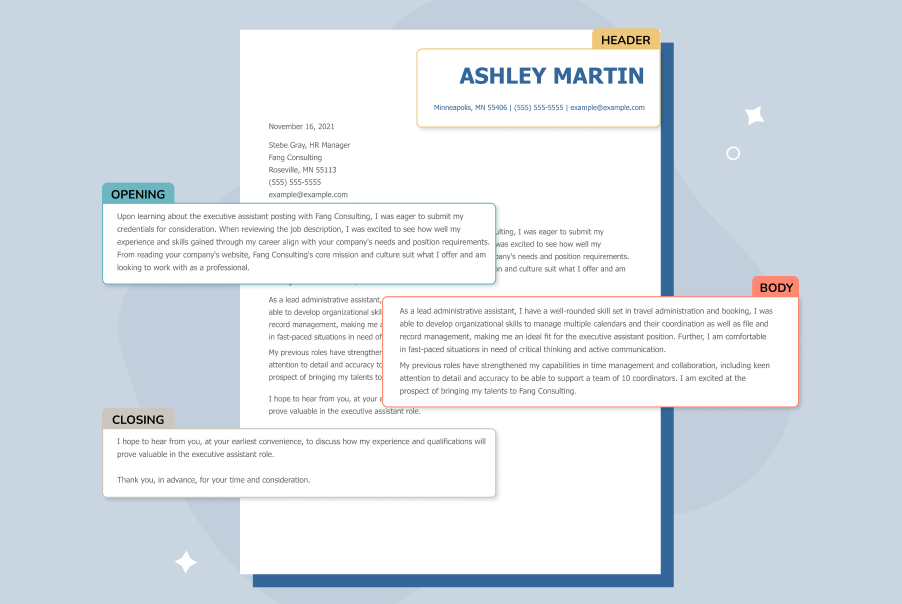Our customers have been hired at: *Foot Note
In today's rapidly evolving job market, the question of whether cover letters are still necessary often sparks debate among job seekers and hiring professionals alike.
In this guide, we’ll discuss when to submit a cover (and when not to). We’ll also offer expert tips on how to write a cover letter that wins interviews. Jump to the following key questions:
Do I Need a Cover Letter?
Whether you need a cover letter depends on the job, the employer's requirements, and your unique situation. While some companies explicitly require one, others make it optional.
Unless otherwise specified, it’s always a good idea to submit a cover letter with your resume. A strong cover letter can play a crucial role in helping you stand out from other applicants.
While not every job requires a cover letter, including one can give you a competitive edge. It allows you to provide context for your resume, explain any gaps or career shifts, and highlight why you're the perfect fit for the role. A well-written cover letter can make a strong impression.- Jasmine Escalera, Career Professional
Why Are Cover Letters Important?
Cover letters offer a unique opportunity to personalize your job application and add context to your resume skills and work experience. Here are a few key benefits of writing a cover letter:
- Personalization: A cover letter lets you directly address the employer, showing that you’ve researched the company and are genuinely interested in the position. It provides a personalized touch that a resume alone can’t always offer.
- Highlighting key skills: A cover letter provides the opportunity to emphasize specific hard skills and soft skills that align with the job you're applying for. You can explain how your background makes you a great fit for the role.
- Explaining career transitions: If you’re changing careers or have gaps in your employment history, a cover letter allows you to explain these aspects and demonstrate how your past experiences are relevant to the new role.
- Creating a narrative: In your cover letter, you can tell a compelling story about your career journey and aspirations, helping employers see how your goals align with their company’s mission and values.
- Demonstrating communication skills: A cover letter is an opportunity to showcase how your communication skills allow you to convey information effectively, engage with your audience and present yourself professionally.
- Standing out: A strong cover letter can differentiate you from other candidates who might have similar qualifications but didn’t take the time to provide a personalized explanation of their fit for the role.
A cover letter can be a great addition to your resume. A cover letter lets you take more control over your career narrative and provide an employer with additional information as you make the case for why you are the right candidate for the role they are hiring for.- Toni Frana, Career Professional
When Are Cover Letters Necessary?
A cover letter helps you make a stronger, more personalized impression on potential employers. Ensure that you include one with your job application in the scenarios detailed below.
#1. The job description requests a cover letter
If the job description specifically asks for a cover letter, it is essential to include one with your application to demonstrate your ability to follow instructions and genuine interest in the role.
Your cover letter is also a chance to address any unique aspects of your professional background that align with the requirements of the role you are applying for.
See our library of cover letter examples for professionally crafted samples tailored to different roles, industries, and career levels.
#2. You have a personal connection to the company
Include a cover letter to discuss a personal connection, such as a referral from an employee or a professional contact who recommended the company.
Mention this connection and highlight how you learned about the opportunity, explaining how your relationship with the contact could benefit the company.
This personal touch can help make your application stand out. See the qualities of successful cover letters for more tips and examples to craft a compelling letter.
#3. You are changing careers or have employment gaps
If you’re shifting to a new field or have gaps in your employment history, a cover letter provides a space to explain these transitions and gaps to employers.
You can address potential concerns and emphasize how your background and transferable skills make you a strong candidate despite your limited experience directly related to the role.
We also recommend checking out our guide on addressing employment gaps in a resume to ensure that your job application effectively explains your professional history.
#4. You are applying for your dream role
For your dream job, a cover letter is essential to conveying your enthusiasm and making a compelling case for why you’re the ideal candidate.
It allows you to explain why this role and company are particularly important to you, what drives your passion, and how your goals align with the company’s mission.
See our cover letter format guide to ensure that your letter is organized properly to present your skills and qualifications in the best possible light.
When Not to Include a Cover Letter
Even if a cover letter is not explicitly requested, it can still be beneficial to include one, as it provides additional context and can set you apart from other candidates.
However, there are some scenarios when a cover letter might not be necessary, or even discouraged. Explore when not to submit a cover letter below.
#1. The job description says not to include one
If the job description specifically instructs you not to include a cover letter, it’s important to follow these instructions.
In this case, submitting a cover letter could go against the employer’s guidelines and potentially harm your application. Focus instead on writing a resume that aligns with the job requirements.
#2. Your cover letter is not tailored to the role
If your cover letter is generic and not tailored to the specific role or company, it’s crucial to revise it before submission or not submit it at all.
Tailoring your cover letter to the job shows that you’ve invested effort into understanding the position and the company, and it helps you make a more compelling case for your candidacy.
Use one of our cover letter templates to quickly and easily generate customized cover letters for every role you apply for.
#3. The application process does not allow it
If the application platform does not provide a specific field or option for submitting a cover letter, it means the system is not set up to accept one.
In this case, you should follow the instructions provided by the platform and focus on optimizing your resume.
If a cover letter is important to you, you might consider reaching out to the employer directly to ask if you can send it via email or another method.
#4. Including one does not make sense for the role
For jobs with quick, high-volume hiring processes, such as retail, hospitality, and warehouse work, recruiters often prioritize resumes over cover letters.
If your resume fully conveys your qualifications and experience, a cover letter that simply repeats the same information may not add value.
Additionally, some industries (such as tech startups) may prioritize networking, portfolios, or project-based applications over traditional cover letters.
How a Cover Letter Improves Your Job Application
While your resume presents your qualifications, a cover letter allows you to personalize your application by tailoring your message to the specific job and company.
Here are a few ways that a compelling cover letter can supplement your resume:
- Contextualization: A cover letter provides context for your resume. You can explain how your technical skills and experiences align with the job requirements, and highlight how your background makes you an ideal fit for the role.
- Emphasizing your enthusiasm: A cover letter provides an opportunity to convey your enthusiasm and motivation for the role. Passion and a genuine interest in the position can make a strong impression and complement the factual information in your resume.
- Demonstrating soft skills: While your resume focuses on hard skills and accomplishments, your letter's writing style and tone showcase your communication skills and enthusiasm.
- Highlighting key achievements: The cover letter can highlight measurable accomplishments that are particularly relevant to the job but might not be fully detailed on your resume.
- Showcasing fit with company culture: A cover letter allows you to express how your values align with company culture. This can be an important factor for employers looking for candidates who will mesh well with their team.
We recommend using our Cover Letter Generator to create a customized cover letter. You’ll receive professionally crafted templates and content suggestions specific to your target role.
Examples of Effective Cover Letters
Explore the examples of strong cover letters below. You can edit them directly in our Cover Letter Generator and personalize them to the role you're applying for.
Teacher
This teacher cover letter exemplifies effective strategies for showcasing relevant professional and academic achievements and a passion for education.
Data Entry Clerk
This data entry clerk cover letter effectively showcases and aligns the candidate’s experiences with the target role. Notice the use of bullet points to list relevant accomplishments.
Marketing Intern
The marketing intern cover letter above successfully communicates relevant academic experiences and achievements, as well as familiarity with relevant marketing tools.
Library Assistant
The library assistant cover letter above is an example of a concise yet effective cover letter. It highlights relevant skills and connects them to the target role.
Tips for Writing a Strong Cover Letter
- Capture attention: Begin with a strong opening line that grabs attention. Mention a connection to the company, a mutual contact or express genuine enthusiasm for the role.
- Research the company: Demonstrate knowledge of the company’s projects, mission, and recent achievements. Mention how these align with your skills and interests.
- Be selective: Choose one or two key experiences that directly relate to the job. To demonstrate success, use specific examples and quantify results whenever possible.
- Maintain professionalism: Even if the company culture seems casual, keep the tone professional, respectful, and enthusiastic without being overly formal or stiff.
- Be proactive: End with a call to action, expressing your desire to discuss your application in more detail and your eagerness to contribute to the team.
What Employers Look for in a Cover Letter
Explore the key elements of an effective cover letter below. You can also check out what to include in a cover letter for additional examples and tips from career experts.
Relevance to the role
Employers want to see how your skills, experiences, and qualifications specifically match the requirements of the job.
For each key requirement listed in the job description, provide examples from your past experiences that demonstrate how you meet or exceed those requirements.
Specific examples
Providing concrete examples of your achievements and experiences helps illustrate how your background aligns with the job.
Specific examples make your claims more credible and demonstrate your qualifications effectively. Here are a few examples:
- "Spearheaded a strategic initiative that boosted quarterly sales by 20%, through enhancing the sales team's engagement techniques and digital marketing efforts."
- "Successfully led a project team to deliver a critical software development project two weeks ahead of schedule, which directly improved client satisfaction by 30%."
- "Implemented operational changes that reduced costs by 15% annually by optimizing supply chain management and negotiating better rates with vendors."
Demonstrated enthusiasm
Demonstrate genuine enthusiasm for the role and the company. Employers are often looking for candidates who are not only qualified but also motivated and excited about the opportunity.
Mention specific projects, products, or values of the company that resonate with you. This shows that your interest is not generic but tailored to this particular organization. For example:
“I have been following your company’s innovative contributions to renewable energy solutions. I am impressed by your commitment to sustainability, as demonstrated by the recent launch of your solar-powered product line.”
Alignment with company goals
Employers appreciate when candidates connect their skills and experiences to the company’s goals or challenges and express how they can contribute to its success.
Explicitly connect your past experiences to what the company aims to achieve. Show how your personal career goals and accomplishments can contribute to their objectives. For example:
“With over five years of experience in high-level project management and a proven track record of reducing costs and increasing efficiency, I am excited about the opportunity to contribute to your goals of expanding into new markets and optimizing operational processes.”
Professional tone
A professional tone, proper grammar, and clear language are crucial. This reflects your communication skills and attention to detail, both of which are important in almost any role.
Here are key strategies to ensure your cover letter remains professional:
- Use a formal greeting and closing: After your cover letter header, add a formal greeting, such as "Dear [Hiring Manager's Name]." Close your letter formally with phrases like "Sincerely," "Best regards" or "Respectfully."
- Be concise and focused: A professional cover letter is succinct and to the point. Limit your cover letter length to one page and directly address the skills and experiences that are relevant to the job.
- Avoid slang and idioms: Use clear and straightforward language. Avoid slang, jargon that is not industry-specific, and idioms that might be unclear or too informal. This helps ensure that your message is professional and accessible to all readers.
- Highlight achievements formally: When discussing accomplishments, keep the focus on the impact of your actions, using a professional and modest tone. Quantify achievements when possible and appropriate, and avoid overly boastful language.
Use our ATS Resume Checker to scan for common issues and ensure that your job application is error-free.
Common Cover Letter Mistakes to Avoid
- Repeating your resume: A cover letter should not simply repeat the details of your resume. Instead, use it as an opportunity to tell a story about your experiences and skills that your resume does not fully capture.
- Lack of customization: Sending a generic cover letter that doesn’t mention the company or position specifically is a common error. Tailor each letter to the job and company, mentioning specific skills or experiences that directly relate to the job.
- Informal tone: While expressing your personality is important, an overly casual tone can come across as unprofessional. Maintain a professional tone throughout and avoid slang, overly colloquial language, and humor, which might not translate well.
- Typos and grammatical errors: Errors in your cover letter can make you appear careless or attentive to details. Always proofread your cover letter multiple times, and if possible, have someone else review it to catch mistakes you might have overlooked.
- Incorrect company or hiring manager name: Sending a cover letter addressed to the wrong person or referencing the wrong company can happen when you're recycling the same letter for multiple jobs. Always double-check that you've updated these details.
Alternatives to Traditional Cover Letters
Some modern companies explicitly state that cover letters are not necessary, preferring other forms of application, such as video submissions or concise project descriptions.
Here are several creative alternatives to the conventional cover letter that you might consider:
- Video cover letters: A short video resume and cover letter where you introduce yourself, explain why you are interested in the role, and highlight key achievements.
- Portfolio links: A curated collection of your best work presented on a personal website or a professional platform.
- Letter of intent: A letter of intent that expresses a broader interest in an organization or a potential role rather than responding to a specific job posting.
- Project proposals or case studies: A proposal for a project you could undertake if hired, or a case study demonstrating how you solved a similar challenge in the past.
- Email cover letters: A concise, direct email where you introduce yourself and attach or link to your professional portfolio or professional profile.
Always check the job posting or company’s career page to understand whether a cover letter is expected or required.
Key Takeaways
- Although cover letters are not always mandatory, they offer a unique opportunity to communicate directly with potential employers and provide insights into your personality.
- A well-crafted cover letter can differentiate you from other candidates by providing context to your resume and showcasing your communication skills.
- If the job posting does not specify a cover letter, it’s best to include one to demonstrate your enthusiasm and interest in the role.
- Crafting a strong cover letter involves showcasing how your unique skills and experiences align perfectly with the job requirements and the company's goals.
FAQ
Should you write a cover letter for online job applications?
When applying for jobs online, whether or not you need a cover letter depends on several factors including the employer’s requirements and the platform through which you are applying.
If the job posting explicitly asks for a cover letter, you should include one with your resume. Failing to do so can be seen as not following directions or a lack of attention to detail.
Even if a cover letter is listed as optional, submitting one can demonstrate your enthusiasm for the position and give you an edge over applicants who don’t include one.
See our basic cover letter guide for tips on writing a concise yet compelling cover letter that captures your skills and qualifications.
Is it unprofessional to not have a cover letter?
It is not inherently unprofessional to omit a cover letter unless one is specifically requested. However, it’s safer to include a well-written cover letter with your application when in doubt.
This approach shows initiative and can set you apart from other candidates by demonstrating your enthusiasm for the role and your dedication to securing the position.
Are cover letters still necessary?
While it is possible that some recruiters may skip over cover letters, focusing instead on resumes, many others still value them as an essential part of the application process.
Many hiring managers value cover letters as they provide insights into an applicant’s motivation, personality, and attention to detail.
It’s often better to err on the side of inclusion, particularly when you have specific points to communicate that your resume does not fully address.
Always tailor your cover letter to the role and company to reflect your enthusiasm and fit. This will make it more likely to catch the recruiter’s eye.
Does writing a cover letter make a difference?
Yes, writing a cover letter can significantly improve your job application process and enhance your chances of securing an interview.
A cover letter gives you an opportunity to express your personality, enthusiasm, and motivation, which are difficult to convey fully on a resume.
It allows you to tell your story in a way that might not be possible through a resume alone, including explaining non-linear career paths or unique experiences.
Do I need a cover letter for an internship?
Yes, cover letters are often necessary and beneficial when applying for internships, allowing you to show that you are genuinely interested in the opportunity.
You can use an internship cover letter to explain why you are drawn to the company or the specific industry.
This is particularly important for internships, as they are often exploratory, helping you determine your future career path.
Even if you have limited work experience, a cover letter lets you highlight relevant coursework, school projects, or extracurricular activities that demonstrate skills applicable to the internship.
What if a job does not ask for a cover letter?
Including a cover letter even when it’s not requested can demonstrate initiative, interest, and a willingness to go the extra mile.
It provides an opportunity to explain your qualifications and enthusiasm for the position in more detail, which can help you stand out.
See our ChatGPT cover letter guide for tips and tricks on using AI to support the cover letter writing process.
Do I need a cover letter for every job?
When in doubt, it’s best practice to submit a cover letter for every job application unless otherwise specified in the job description.
While not every employer requires one, a well-crafted cover letter can give you a competitive edge by showcasing your enthusiasm and qualifications in a way that a resume alone cannot.
Customizing your cover letter for each job is crucial. A tailored one allows you to highlight how your skills match the specific job requirements and demonstrate your interest in the company.
How we reviewed this article
Since 2012, we have helped more than 11 million job seekers. We want to make your career journey accessible and manageable through our services and Career Center’s how-to guides and tips. In our commitment to bring you a transparent process, we present our Editorial Process.
Our customers have been hired at:*Foot Note


